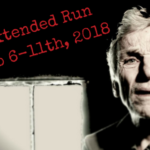At Theatre Passe Muraille Backspace, Toronto, Ont.
 Bob Nasmith
Bob Nasmithphoto: Graham Isador
Written by Samuel Beckett
Directed by Mac Fyfe
Set and lighting by Chris Clifford
Sound by Andrew Dollar
Costume by Angela Thomas
Cast: Bob Nasmith
Bob Nasmith gives a towering performance as Krapp in this towering play about memory, regret, aging, folly and bananas.
The Story. To paraphrase Bob Nasmith in a recent talk-back: Krapp’s Last Tape is a comedy (or comedy-drama if you prefer) about an old, lonely man reminiscing about his life, loves, younger, brasher self, sometimes with affection, sometimes with disgust, often with regret.
The Performance. As per the stage directions, set designer Chris Clifford has provided a sturdy desk with two drawers that lock facing the audience. There is a reel to reel tape recorder on the table. Krapp (Bob Nasmith), old, wizened, dishevelled sits at the table looking out, holding the stare. But director Mac Fyfe has positioned Krapp to sit at the side of the table and not facing forward as per Beckett’s stage directions. Interesting choice. Beckett is precise in describing Krapp: “White face. Purple nose. Disordered grey hair. Unshaven. Very near-sighted (but unspectacled. Hard of hearing.”
Bob Nasmith is almost ghost-like his skin is so pale-white. The only colour on that pale face is the purple of the nose, perhaps suggesting a drinker. His hair is wild and white. Krapp’s clothes (Angela Thomas) are worn and shabby. He wears dirty white boots that look like they are lace-ups but the tongues stick out of them.
Krapp has recorded his life on reel to reel tapes, carefully marked each tape and the box in which they are kept. The boxes are at the back, out of the light (Chris Clifford). He plays a tape of himself from 30 years ago. Memories rush in. An old love; a dalliance. He sneers at his much younger self for that young man’s arrogance and pretension. His younger self uses a word the definition of which his older self doesn’t know. Ever curious, Krapp goes to a large dictionary and looks up the word. Bob Nasmith, stares out, pondering the word, perhaps marveling that his younger self knew the definition but his older self forgot. He still thinks disparagingly of his pompous, younger self.
Krapp meticulously locks everything away in those two drawers of the desk. He takes keys out of his vest pocket, holds them up to the light to chose the right one to unlock the drawer, unlocks it, finds a tape, checks it in the light, locks the drawer, puts the keys in his vest pocket and then puts the tape on to play. He re-winds and fast forwards the tapes to various places, listening to his younger self. Recalling the memory, sometimes with pain, sometimes with joy. (Huge kudos to Andrew Dollar for the sound design and the precise playing.)
Krapp takes the keys out of his vest pocket again, holds it up to the light, unlocks the second drawer, fishes around in it, takes out a banana and locks the drawer. One of the mysteries of this compelling play—why lock up your bananas? But of course, one must consider who is locking them up—a man alone, suspicious, careful, meticulous, lonely.
He gets pleasure from that banana. He strokes it, makes the first peel and then struggles with the rest until the banana fruit is free. I worry about that banana. It’s green. Of course it’s hard to peel. Nasmith hands that difficulty with ease. He stands with the whole banana fruit in his mouth, looking, perhaps a glint in his eye at how funny this must look.
An actor can do a good job of Krapp by follow the meticulous stage directions, meticulously, but great acting is something else. Bob Nasmith dissolves into the skin of Krapp. He gets lost in the reverie of memory. He and his sensitive director, Mac Fyfe are not afraid to hold a moment, trusting the audience to hold the moment at well. Nasmith’s voice is like a musical instrument, clear and melodious, yet it conveys the weariness of the man as well as his joy at some memories.
Krapp records a tape after he listens to earlier ones. Perhaps this is the most moving one, not for him, but for us, because we know it’s his last. For all of Krapp’s irascibility Nasmith makes his Krapp endearing; we are pained for him at the wounding memories, joyful when he remembers sweet memories and are touched in between.
Comment.
Bob Nasmith is one of the pioneers of Theatre Passe Muraille, having acted there since the beginning. It’s fitting in this the theatre’s 50th anniversary, that Nasmith continues to contribute so mightily in this towering performance. It’s held over to Feb. 11. You can’t miss it.
Produced by Claire Burns and Bob Nasmith (Singing Swan Productions), VideoCabaret and Wily Pig.
First performance: Jan. 18, 2018.
Closes: Feb. 25, 2018. (it’s held over).
Running Time: 45 minutes.
www.passemuraille.ca
{ 1 comment… read it below or add one }
Me and my brother ,Bob Nasmith, were total opposites growing up. Thirty years past
before we started being friends. His passions were live theater acting and trout fishing.
Bob could focus his sharp mind on something very intensely, and yet maintain
awareness of other things happening around him. It was like his mind had more
than one channel. I will miss him.